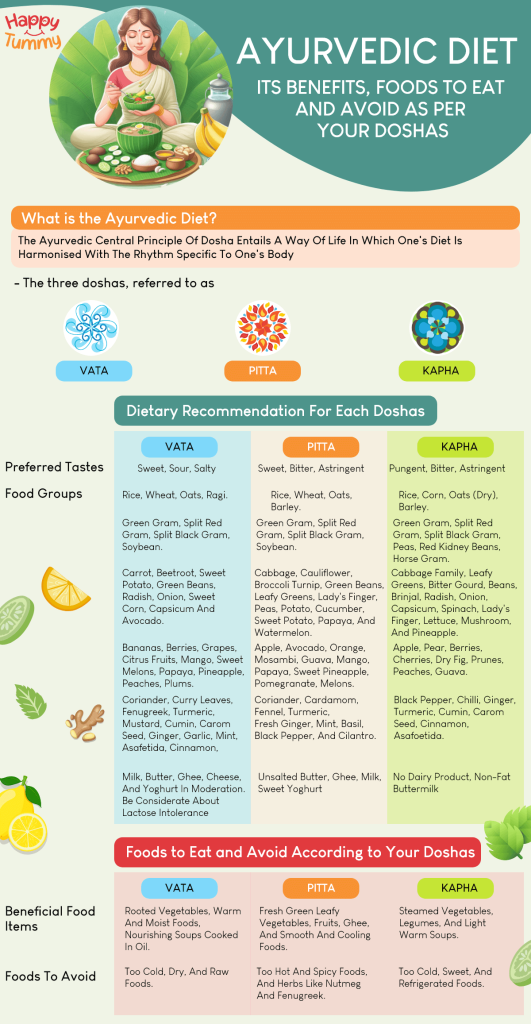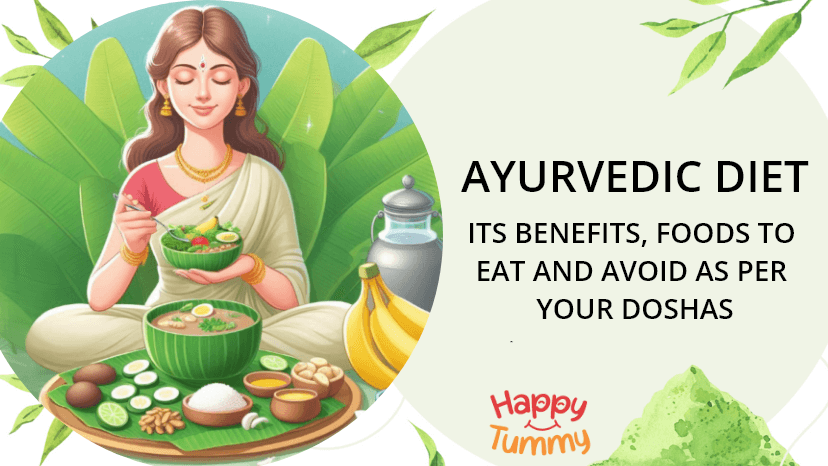Table of Contents
Ayurvedic nutrition is a holistic system that bases itself on the principles of creating a profound balance between the physical, psychological, and spiritual self. Based on this understanding, this dietary approach aims to balance doshas and dhatu that can support health.
Ayurveda is one of the world’s oldest systems of medicine, originating from India. It sees food as having a profound impact on wellness. Hence, it involves consuming food based on body type, which may enhance body health, mind competence, and emotional steadiness [1].
Therefore, this blog focuses on understanding the Ayurvedic diet’s health benefits and guidelines based on ancestral knowledge and current scientific findings.
What is the Ayurvedic Diet?
The Ayurvedic central principle of dosha entails a way of life in which one’s diet is harmonised with the rhythm specific to one’s body [2].
The three doshas, referred to as Vata, Pitta, and Kapha, are formed out of the five elements and control our physiological and pathological tendencies [3].
Hence, one has to follow the principles of ‘Svasthya’, where the physical and physiological functions, metabolism and detoxification, tissues, sense organs, mind, and degree of self-awareness are in line [4].
This balance is maintained by the kind of food that we eat, along with our lifestyle and mental well-being. Each of these aspects plays a very important role in supporting our overall health and harmony.
In Ayurveda, understanding how these elements interact is important. Let us make informed dietary choices that align with our unique constitution. All that we intake is categorised as follows for a clearer and deeper understanding of its actions [5]
- Taste (rasa)
- Qualities (guna)
- Potency (virya)
- Therapeutic actions (karma)
- Consequences after digestion (vipaka)
Also, there are six primary tastes: sweet, sour, salty, pungent, bitter, and astringent. Let us learn more about how the Ayurvedic diet entails using food to manage the three doshas in accordance with their values.

Dietary Recommendation For Each Doshas
An individual’s prakriti, or constitution, is a crucial determinant of how food affects the body. Each person’s prakriti is characterised by their own unique physical, physiological, and psychological attributes that influence dietary choices [6].
Let’s understand some recommended food groups according to individuals’ dominant dosha, which may help align with their unique Prakriti for optimal health.
| Vata | Pitta | Kapha | ||
| Preferred Tastes [7] | Sweet, Sour, Salty | Sweet, Bitter, Astringent | Pungent, Bitter, Astringent | |
| Food Groups [8] | Cereals (grains) | Rice, wheat, oats, ragi. | Rice, wheat, oats, barley. | Rice, corn, oats (dry), barley. |
| Pulses (legumes) | Split red gram, split black gram, soybean. | Green gram and split red gram. | Green gram, split red gram, split black gram, peas, red kidney beans, horse gram. | |
| Vegetables and Fruits | Carrot, beetroot, sweet potato, green beans, radish, onion, sweet corn, capsicum, and avocado. | Cabbage, cauliflower, broccoli turnip, green beans, leafy greens, lady’s finger, peas, potato, cucumber, sweet potato, papaya, and watermelon. | Cabbage family, leafy greens, bitter gourd, beans, brinjal, radish, onion, capsicum, spinach, lady’s finger, lettuce, mushroom, and pineapple. | |
| Spices | Curry leaves, fenugreek, turmeric, mustard, cumin, carom seed, ginger, garlic, asafoetida, and cinnamon. | Coriander, cardamom, fennel, turmeric, fresh ginger, mint, basil, black pepper, and cilantro. | Black pepper, chilli, ginger, turmeric, cumin, carom seed, cinnamon, and asafoetida. | |
| Dairy | Milk, butter, ghee, cheese, and yoghurt in moderation. Be considerate about lactose intolerance [9]. | Unsalted butter, ghee, milk, sweet yoghurt [10]. | No dairy product, non-fat buttermilk [11]. | |
So, you can now see that there are many food groups to keep track of, but balanced meals with a high fibre content and enough hydration might benefit many health functions in our bodies.
For example, fibre may help regulate blood sugar and keep your bowel healthy. Hence, find out your fibre intake via your diet with the Aashirvaad My Meal Plan test for free.
In the end, food is not just nutrition; it’s the foundation of life itself.
What Foods to Avoid According to Your Dosha
As you read about the various body types and connect them to food, keep in mind that while nature provides us with many nourishing options, consuming them incorrectly might lead to imbalances.
For instance, people with a Vata body type may not do their best if they frequently consume pungent, bitter, or astringent foods [12].
With this in mind, let’s get straight to which food items those with pronounced dosha should not eat for the benefit of their balanced body.
| Vata | Pitta | Kapha | |
| Beneficial Food Items | Rooted vegetables, warm and moist foods, nourishing soups cooked in oil. | Fresh green leafy vegetables, fruits, ghee, and smooth and cooling foods. | Steamed vegetables, legumes, and light warm soups. |
| Foods to Avoid | Too cold, dry, and raw foods. | Too hot and spicy foods, and herbs like nutmeg and fenugreek. | Too cold, sweet, and refrigerated foods. |
Benefits of Ayurvedic Diet for Health
A correct quantity of Hitakar Aahar (a beneficial diet) should be consumed at the proper times and according to one’s digestive fire status and the properties of the food; in short, clock with nature [13].
Research has uncovered several health benefits of the Ayurvedic diet, making it a worthwhile option for many individuals.
1. The Management of Type-2 Diabetes (T2D)
- In T2D, Ayurveda suggests a personal approach to food, e.g., Apatarpanaguna (cleansing) for obese patients and Santarpanaguna (nourishing) for lean individuals [14].
- Eat whole foods, avoid processed foods as much as possible, and use medicinal herbs like bitter gourd or fenugreek after consulting your ayurvedic physician.
- In addition, eating should be based on the seasonal variation. For example, during the summer months, try hydrating foods such as watermelon and buttermilk, whereas in the winter, you may prefer heavier options like sesame [15].
- This tailored approach might aid in optimising glycemic control and maintaining the state of health and well-being.
To complement the Ayurvedic focus on personalised nutrition for managing sugar levels, you may consider Aashirvaad Sugar Release Control Atta in your meals. With its low glycemic index, this flour blend aligns with the principles of balanced eating.
You may better support your body’s needs and enhance your well-being by choosing ingredients that promote steady energy release.
2. Brain Health and Mood Enhancement [16]
- Ayurveda recognises a strong connection between diet and psychological states, linking food choices to emotional well-being. This holistic approach emphasises that what we consume may significantly impact our mental health, influencing our mood and cognitive functions.
- Foods can influence mental states categorised as sattva (contentment), rajas (excitement), and tamas (lethargy). This classification emphasises the importance of selecting foods that promote positive mental health, as a balanced diet may foster emotional stability and clarity of thought.
- Further, an Ayurvedic diet includes ingredients like ashwagandha and turmeric, which are known for their adaptogenic properties. These herbs may help reduce stress and enhance emotional well-being. They might also support cognitive function and overall brain health [17].
- Consuming bedtime teas such as Brahmi, Shankhpushpi, or Chamomile might promote better sleep and may also benefit mental health. These herbal teas not only aid relaxation but may also contribute to improved brain function by calming the mind and reducing anxiety. Including these practices in one’s daily routine may lead to enhanced mental clarity and emotional stability.
3. Digestive Health [18]
- Maintaining a balanced digestive fire (Agni) for optimal digestion and metabolism is essential because otherwise, it may lead to various digestive issues.
- The Ayurvedic system promotes homeostasis in digestion through holistic practices that consider individual constitution, dietary habits, and lifestyle factors.
- Ginger, cumin, and black pepper are commonly used spices and herbs for herbal remedies to enhance digestion and alleviate gastrointestinal discomfort.
- Jal Jeera, a traditional beverage made with cumin seeds, black pepper, ginger, and mint, is a refreshing digestive aid that exemplifies how easily available plant-based ingredients can support digestive health.
Understanding your digestive health is crucial for maintaining a balanced Agni and preventing digestive issues. By assessing your gut health with the Aashirvaad Digestive Quotient test, you can gain valuable insights into how your dietary choices impact your well-being. This simple evaluation can guide you toward personalised tips that enhance digestion and support a healthier lifestyle, allowing you to thrive.
4. Promotes Overall Wellness [19]
- Ayurveda profoundly understands how food impacts physiology. Thus, it provides a system with valuable insights for disease management and encourages personalised nutrition tailored to individual needs.
- By focusing on each person’s unique constitution, Ayurveda promotes balanced, integrative dietary choices that address symptoms and may also support long-term health.
- Understanding one’s dosha allows for informed food selections that align with genetic makeup, leading to improved health outcomes and a deeper connection to one’s well-being [20].
How Your Body Adapts to Food Habits [21]
This approach is practical because general dietary guidelines may not suit everyone’s needs. Individual differences in metabolism, digestive capacity (agni), and genetic makeup mean that what works for one person may not work for another.
Hence, consult a dietician if you plan to make significant nutritional changes or are experiencing new symptoms. Aashirvaad health experts will help you with nutritional recommendations and design personalised meal plans for healthy outcomes.
To create personalised food and lifestyle recommendations, Ayurveda also integrates clinical principles such as:
- Prakriti (your individual constitution)
- Dosha-Dushya (the state and location of diseases)
- Satmya (your body’s habituation)
Conclusion
The Ayurvedic diet is one of the most therapeutic tools for balancing our bodies and minds. To get the most out of the Ayurvedic diet’s benefits, it’s important to focus on Sattvic foods, which are fresh, pure, and light.
This is in contrast to the Rajasic diet, which is spicy, fiery, and stimulating. Also, Tamasic foods are processed, so not eating them means we may gain calmness, a focused mind, emotional stability, and a healthy body.
Natural, unprocessed, and balanced whole foods might help enhance the digestive process, facilitate proper absorption of nutrients, and eliminate waste from the body, which forms the basis of better immunity, energy, and health [22].
Ayurvedic diet promotes mindful eating, helps you follow a diet that suits your body, and works with the cycles of nature to live in tune with it. From treating specific health conditions to providing a practical path to lasting wellness, Ayurveda is the science of life that offers a rooted approach that we can easily seek.
FAQs
Ayurveda considers digestion the basis of health and provides individual dietary and lifestyle advice to help control digestive wellness. Natural remedies, such as Triphala and Herbs like Ajwain and Hing may help digestion and ease discomfort. While they may not fully treat or cure, they might deliver incredible improvement by readdressing dosha imbalances and digestive triggers.
According to Ayurveda, your largest meal should be between 10 AM and 2 PM, as that is when your digestive fire (Agni) is at its peak. Ideally, have breakfast before 10 AM and light dinner by 6-7 PM for the Agni to perform better and improve your overall health because, after that, our Agni naturally declines.
According to Ayurveda, digestion is a holistic practice that involves
Eating according to your Prakriti
Avoiding incompatible food combinations
Being aware of the triggers of gut symptoms from fried and non-compatible foods.
Opt for herbal teas such as cumin-coriander-fennel tea
Probiotics like yoghurt
For individuals with gut disorders, always speak to a healthcare practitioner for more personalised recommendations.
Some practices, such as mindful eating, yoga, pranayama (breathing exercise), and Sattvic foods (fresh, pure, and calming), may help clear the mind and reduce stress. Ashwagandha or Brahmi may promote emotional resilience. However, it is always wise to have the input of an Ayurvedic practitioner before you take any health supplement dose.















